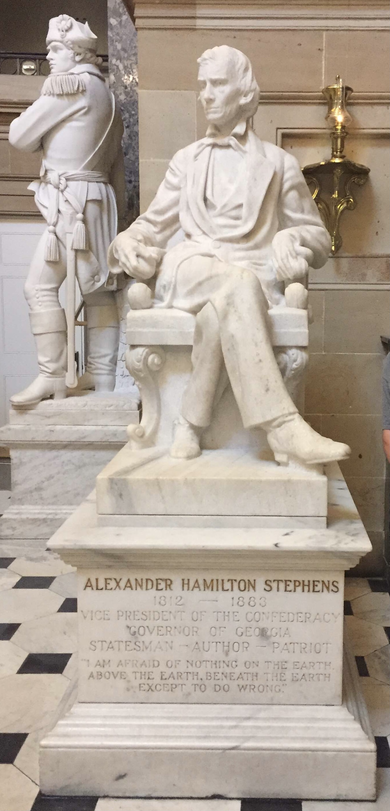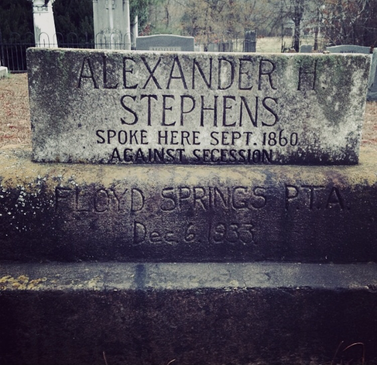 Stephens' Statue in Statuary Hall Stephens' Statue in Statuary Hall Sam Burnham, Curator There has been a lot of discussion about “canceling” Alexander H. Stephens. There has been serious talk of removing his statue from Statuary Hall in the US Capitol. His critics reduce him to one speech, one role in government, one issue. The move to mothball his legacy in favor of a more politically correct narrative would rob us of a lesson, a priceless example, and a voice of wisdom that we desperately need right this minute. In the aftermath of the 2020 election the state of Texas led a lawsuit against a few other states. They took their complaint to the Supreme Court and the court refused to hear it. Shortly afterwards the Texas GOP released a statement suggesting certain states should form their own union, a slightly veiled threat of secession. Several pundits including Rush Limbaugh have gone as far to say the actual words. Twitter, and on a larger scale Parler, was abuzz with rhetoric of secession and civil war. My thoughts we back to Stephens. Such is the danger of eliminating him. He has already been marginalized to the point that he doesn’t come up in these conversations. He spent much of 1860 touring Georgia, asking, no, begging people to stay put. His message was fairly simple. He argued that Georgia had not exhausted every option at working within the Constitution to defend their grievances. He predicted that the inevitable war would be fought on our land, in our fields, at our homes. The horrors of war would be laid on our doorsteps.  Memorial Marker, Floyd Springs, Georgia Memorial Marker, Floyd Springs, Georgia He gave these warnings at Floyd Springs Methodist Church in September of 1860. In May of 1864, elements of Sherman’s forces marched through the churchyard on their quest to find a suitable crossing of the Oostanaula River. Stephens had warned them less that four years previous. Less than a week later, those soldiers captured Rome, Georgia. In November of that year they burned Rome to the ground and set out to march to the sea. He told Georgians to wait, to be patient, to let cooler heads prevail. He tried to walk us back from the ledge. In churches and town squares he repeated his warning. In December of 1860 he again gave his plea. In the house chamber in Milledgeville he fiercely debated his best friend, Robert Toombs at Georgia’s Secession Convention. Toombs won the day. Georgia left the Union and the rest is history. And so we have a cautionary tale from the past. Some of the similarities are striking. A divisive presidential election, regional allegiances, cultural upheaval, even the dubious addition of two states to pad the Electoral College. Regional and political factions spent four years killing each other. Cities were burned to the ground, lives were shattered. I can’t go so far as to say it was all avoidable. The rifts were profound. But Stephens embodied Georgia’s state motto: Wisdom, Justice, Moderation. There were others but he stands out. In the end, emotion, angry rhetoric, arrogance, and stubbornness brought secession, war, and destruction. As the rhetoric of our current political reality continues to polarize, we approach a similar situation. The question: do we have a real moderating voice? This doesn’t mean sound bites or campaign snippets. It means listening. It means compromise. It means leadership. Stephens embodied that. Canceling his history is not only foolish. In our present circumstances, it’s dangerous.
0 Comments
Leave a Reply. |
Sam B.Historian, self-proclaimed gentleman, agrarian-at-heart, & curator extraordinaire Social MediaCategories
All
Archives
November 2022
|




 RSS Feed
RSS Feed
